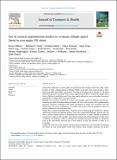Use of natural experimental studies to evaluate 20mph speed limits in two major UK cities
Abstract
Introduction Reductions in traffic speed can potentially offer multiple health and public health benefits. In 2016, implementation of 20mph (30kph) speed limit interventions began in Edinburgh (city-wide) and Belfast (city centre). The aims of this paper are to describe 1) the broad theoretical approach and design of two natural experimental studies to evaluate the 20mph speed limits in Edinburgh and Belfast and 2) how these studies allowed us to test and explore theoretical mechanisms of 20mph speed limit interventions. Methods The evaluation consisted of several work packages, each with different research foci, including the political decision-making processes that led to the schemes, their implementation processes, outcomes (including traffic speed, perceptions of safety, and casualties) and cost effectiveness. We used a combination of routinely and locally collected quantitative data and primary quantitative and qualitative data. Results The evaluation identified many contextual factors influencing the likelihood of 20mph speed limits reaching the political agenda. There were substantial differences between the two sites in several aspects related to implementation. Reductions in speed resulted in significant reductions in collisions and casualties, particularly in Edinburgh, which had higher average speed at baseline. The monetary value of collisions and casualties prevented are likely to exceed the costs of the intervention and thus the overall balance of costs and benefits is likely to be favourable. Conclusions Innovative study designs, including natural experiments, are important for assessing the impact of ‘real world’ public health interventions. Using multiple methods, this project enabled a deeper understanding of not only the effects of the intervention but the factors that explain how and why the intervention and the effects did or did not occur. Importantly it has shown that 20mph speed limits can lead to reductions in speed, collisions and casualties, and are therefore an effective public health intervention.
Citation
Milton , K , Kelly , M , Baker , G , Cleland , C , Cope , A , Craig , N , Foster , C , Hunter , R , Kee , F , Kelly , P , Nightingale , G , Turner , K , Williams , A J , Woodcock , J & Jepson , R 2021 , ' Use of natural experimental studies to evaluate 20mph speed limits in two major UK cities ' , Journal of Transport and Health , vol. 22 , 101141 . https://doi.org/10.1016/j.jth.2021.101141
Publication
Journal of Transport and Health
Status
Peer reviewed
ISSN
2214-1405Type
Journal article
Description
This research was funded by the National Institute for Health Research (NIHR), grant number 15/82/12.Collections
Items in the St Andrews Research Repository are protected by copyright, with all rights reserved, unless otherwise indicated.

